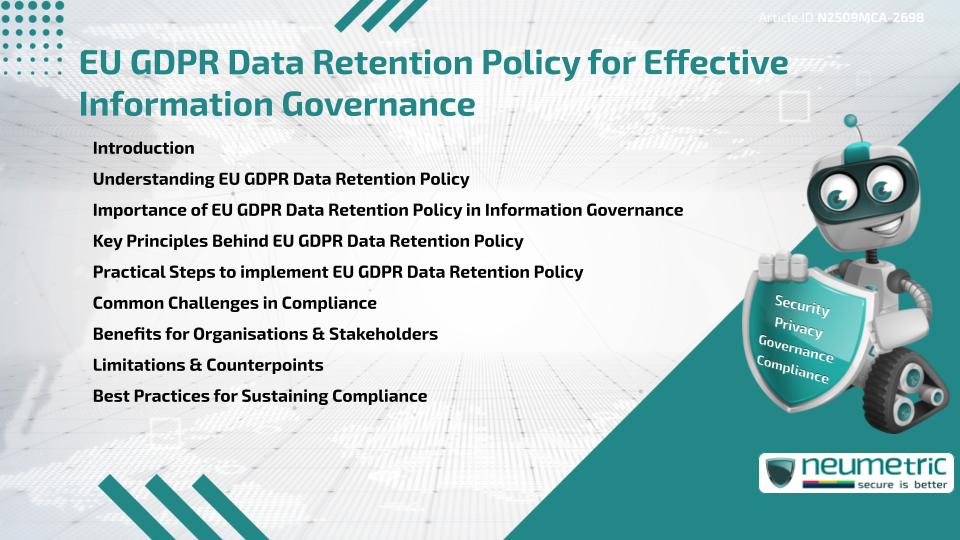Table of Contents
ToggleIntroduction
EU GDPR Data Retention Policy is a crucial component of effective Information Governance, ensuring organisations manage Personal Data responsibly. By setting clear timelines for how long data can be stored, it reduces Risks, enhances Transparency & Accountability & supports Business Objectives & Customer Expectations. For enterprises dealing with EU Citizens’ Data, establishing an EU GDPR Data Retention Policy is not just a Compliance obligation but also a way to build Trust with Clients & Partners.
Understanding EU GDPR Data Retention Policy
The General Data Protection Regulation [GDPR] does not prescribe exact retention periods but requires organisations to retain data only as long as necessary for lawful purposes. An EU GDPR Data Retention Policy outlines retention schedules, deletion processes & exceptions based on Regulatory Standards. It ensures enterprises avoid keeping data longer than required, thereby reducing exposure to Cybersecurity Risks & potential Penalties.
Importance of EU GDPR Data Retention Policy in Information Governance
An EU GDPR Data Retention Policy helps enterprises strengthen their Information Governance by:
- Defining clear rules for storing & deleting data.
- Demonstrating adherence to Ethical & Regulatory Standards.
- Minimising the Likelihood of Data Breaches.
- Supporting Business Continuity through efficient Data Management.
Key Principles Behind EU GDPR Data Retention Policy
The Framework is guided by GDPR principles, including:
- Lawfulness, Fairness & Transparency – Data must be processed responsibly.
- Purpose Limitation – Data should only be used for specific, lawful purposes.
- Data Minimisation – Organisations should keep only what is necessary.
- Storage Limitation – Data must not be kept longer than needed.
- Integrity & Confidentiality – Appropriate Security Controls must protect data.
Practical Steps to implement EU GDPR Data Retention Policy
Enterprises can implement an EU GDPR Data Retention Policy by:
- Defining Scope – Identify Personal Data categories collected.
- Mapping Data Flows – Understand Systems, Processes & Services handling data.
- Risk Assessments – Evaluate Risks tied to long-term storage.
- Retention Schedules – Set timelines based on purpose & legal obligations.
- Automated Deletion – Apply tools to remove expired Records.
- Regular Audits – Use Internal & External Audits to verify Compliance.
Common Challenges in Compliance
Organisations often face hurdles in implementing an EU GDPR Data Retention Policy:
- Difficulty balancing Regulatory Standards with Business Objectives.
- Resource Constraint in updating Legacy systems.
- Managing exceptions for Legal Guidance, archiving or litigation.
- Lack of Continuous Training among Employees.
Benefits for Organisations & Stakeholders
Adopting an EU GDPR Data Retention Policy provides:
- Reduced Cybersecurity Risks through timely data deletion.
- Strengthened Customer Trust by showing Fairness, Transparency & Accountability.
- Improved efficiency in Data Management & Storage.
- Compliance with Global Laws, avoiding Fines & Reputational damage.
Limitations & Counterpoints
While effective, an EU GDPR Data Retention Policy has limitations. It does not prevent all Cybersecurity Threats but reduces data exposure. Moreover, retention schedules may conflict with other Regulatory Standards requiring longer storage, such as Financial or tax laws. Organisations must balance GDPR obligations with sector-specific rules.
Best Practices for Sustaining Compliance
To maintain Compliance, organisations should:
- Perform regular Audits of Retention Practices.
- Provide Continuous Training for Employees.
- Update Retention Schedules as laws evolve.
- Engage Expert Consultation for complex Regulatory conflicts.
- Maintain documentation for Transparency & Accountability.
Takeaways
- Ensures lawful & responsible Data Retention
- Reduces Risks of Data Breaches & Penalties
- Strengthens Customer Trust & Information Governance
- Balances Business Objectives with Regulatory Compliance
- Requires Continuous Monitoring & Improvement
FAQ
What is an EU GDPR Data Retention Policy?
It is a structured policy that defines how long organisations can store Personal Data under GDPR rules.
Why is an EU GDPR Data Retention Policy important?
It ensures Compliance, minimises Risks & builds Customer Trust.
What are the principles of an EU GDPR Data Retention Policy?
They include Lawfulness, Purpose Limitation, Data Minimisation, Storage Limitation & Integrity & Confidentiality.
How can organisations implement an EU GDPR Data Retention Policy?
Through Data Mapping, Retention Schedules, Automated Deletion & regular Audits.
What challenges exist in applying an EU GDPR Data Retention Policy?
Challenges include Resource Constraint, exceptions for Legal needs & Employee Training gaps.
Does an EU GDPR Data Retention Policy guarantee security?
No, it reduces data exposure but must be combined with broader Security Controls.
Who must adopt an EU GDPR Data Retention Policy?
Any enterprise processing EU Citizens’ Data, regardless of location, must implement it.
Need help for Security, Privacy, Governance & VAPT?
Neumetric provides organisations the necessary help to achieve their Cybersecurity, Compliance, Governance, Privacy, Certifications & Pentesting needs.
Organisations & Businesses, specifically those which provide SaaS & AI Solutions in the Fintech, BFSI & other regulated sectors, usually need a Cybersecurity Partner for meeting & maintaining the ongoing Security & Privacy needs & requirements of their Enterprise Clients & Privacy conscious Customers.
SOC 2, ISO 27001, ISO 42001, NIST, HIPAA, HECVAT, EU GDPR are some of the Frameworks that are served by Fusion – a SaaS, multimodular, multitenant, centralised, automated, Cybersecurity & Compliance Management system.
Neumetric also provides Expert Services for technical security which covers VAPT for Web Applications, APIs, iOS & Android Mobile Apps, Security Testing for AWS & other Cloud Environments & Cloud Infrastructure & other similar scopes.
Reach out to us by Email or filling out the Contact Form…


